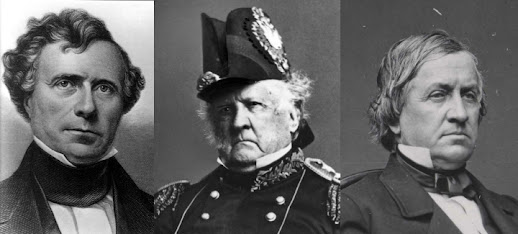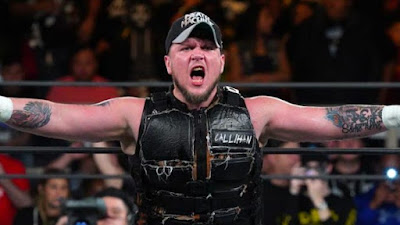The Election Of 1852: Franklin Pierce vs. Winfield Scott vs. John P. Hale
Intro: Hello and welcome back to another edition of the presidential election articles as will be discussing the election of 1852, somewhat of a watershed election in more ways than one as Franklin Pierce takes on General Winfield Scott and John P. Hale in another three way bout for the presidency...Let's get into it.
Franklin Pierce would get the party's nomination with William Rufus DeVane King, a Senator from Alabama as his running mate; King was offered as a compromise candidate to many Southern Democrats as having both a Northerner and Southerner on the ticket gave it balance, plus King further made Pierce look acceptable in the eyes of Southern Democrats by referring to the 48 year old former senator as "A Northern Man with Southern Principles".
Background Info
U.S. General turned 12th president of the United States, Zachary Taylor won the office in 1848 and while his views on political issues were vague, some historians believed he was willing to compromise when it came to the issue of slavery and even threated to hang those who attempted to break up the Union.
Unfortunately any impressive feats under "Old Rough and Ready's" time in office wouldn't come to pass as he died a year and a few months into his term after eating some raw fruit and drinking some ice cold milk days earlier with the cause of Taylor's death being cholera as a result of drinking the white house water which was you might remember from the 1840 election article is what led to the death of the previous Whig president, William Henry Harrison and Taylor's predecessor, James K. Polk.
Taylor's vice president, Millard Fillmore was then sworn in as the 13th president of the United States and much like his war hero predecessor Fillmore had to deal with the issue of slavery which had been ignored by the previous commander and chiefs but by the 1850's the issue was the inescapable conflict that was dividing the country in half.
In their attempts to compromise the problem, Whig party leaders: Henry Clay and Daniel Webster proposed a series of bills that would ease the tensions going on within the country as it relates to slavery and the balance between the number of free states and slave states in the U.S.
These bills would be known as 'The Compromise of 1850' and while Zachary Taylor was against the compromise, Fillmore supported it, and this would be his undoing as one of those bills in the Compromise of 1850 was "The Fugitive Slave Law" which basically allowed people to return escaped or runaway slaves back to their masters which made Southerners happy but not Northerners.
To make the law even worse, if one or more people claimed that you were an escaped slave to the authorities even though you weren't, you could still be sent to work for the slave masters and as you can expect this law further divided both sides on the slavery issue as we go into the 1852 election.
Speaking of which, let's look at the candidates starting with the Democrats.
The Democrats Compromised Candidate
At the beginning of the Democratic Party's convention there were four names running to get the nomination:
- Stephan Douglas-The Senator from Illinois
- Lewis Cass- The Senator from Michigan who ran against Zachary Taylor in 1848, but lost
- James Buchanan-The Senator from Pennsylvania
- William L. Marcy- The Secretary of War
However, none of the candidates are able to get enough of the support needed from either the southern or northern wing of the Democratic Party to get the nomination and after 49 ballots, the decision was made to throw in a 'Dark Horse' or compromise candidate to break up the deadlock.
That dark horse came in the form of Franklin Pierce, who was a former Senator and Representative from New Hampshire. Pierce was seen as an interesting candidate to the Democrats mostly due to the fact that he was almost unknown to many in the party and so therefore his views on slavery were uncertain.
So, that's the ticket for the Democratic Party in 1852, now let's look at what's going on with the Whig Party.
The Free Soil Party nominated John Parker Hale, who was an anti-slavery Senator from New Hampshire for president with Indiana native, George Washington Julian as his running mate.
Whigs On the Rocks
The Whig Party by the 1850's are in a downward spiral with the signing of the Fugitive Slave Law which is angering many Northerners within the Whig Party and the fact that the founder of the party, Henry Clay ends up dying months before the election leaves the party into disarray.
By the time the Whigs' nominating convention came around, they were struggling to pick a candidate with the party having to go through 53 ballots before they come to the guy who will be representing the party in the election.
While Millard Fillmore was hoping to get his party's nomination, he only got support from the party's southern wing whereas the northern faction supported Mexican American War Hero, Winfield Scott while a small coalition of Whigs supported Daniel Webster.
By the end of it, Scott would get 159 delegates to Fillmore's 112, ensuring that the decorated general nicknamed "Old Fuss and Feathers" would be the Whig Party's nominee and to balance out the ticket the party chose the Secretary of the Navy from North Carolina, William Alexander Graham as Scott's running mate.
So, those are the candidates for the Democrats and the Whigs but before we get into the campaigns, we have to look at some of the third parties as there were a lot in this election.
The Free Soil Party
One of the biggest third parties to take part in this election was the Free Soil Party which was a predominantly anti-slavery party who formed in 1848 and had actually gotten a lot of seats in Congress, however following the passing of the Compromise of 1850, most free soilers left and returned to the Whig and Democratic parties.
After having an impressive performance in terms of the popular vote in the previous election, the remaining free soilers decided to run another candidate with the hopes of getting electoral votes this time.
Now, were not done yet as there are a few more third parties that need to be discussed which shows you just how divided the country is at this point.
The Other Third Parties
While the Free Soil party might have been the biggest third party to run in the 1852 election, there were several others who ran around this time like the Liberty Party, the Southern Rights Party and even the Union party which was a small band of Whigs who broke away from the Whig Party after Winfield Scott was nominated but also wasn't satisfied with Millard Fillmore as a possible candidate.
Members of the Union Party nominated the Whigs' Secretary of State, Daniel Webster after Webster was once again unsuccessful in winning the Whig Party's nomination for president.
Webster and his running mate Georgian politician, Charles J. Jenkins accepted the party's nomination.
On the opposite side of the coin, the Native American Party later known as the American Party and nicknamed "The Know Nothing Party" also nominated Daniel Webster for president, however he refused to accept their nomination mostly due to the party's xenophobic and nativist stance on several issues.
Even still, these other third parties weren't able to get much momentum as the Free Soil, Whig and Democratic parties as they were already focusing on the issues many of these parties centered around.
Now that we've discussed the candidates and the other parties involved in this election, it's time to look at the campaigning between the two major parties.
The Campaigns
Both Pierce and Scott served in the Mexican American War with Scott being the General who led U.S. forces to victory while Pierce was a Brigadier General who served under "Old Fuss and Feathers" during that war, but another thing that they have in common is their party platforms when it comes to this election.
Neither the Whigs or Democrats are taking a hard stance when it comes to the issue of slavery and in fact, they share some of the same policy ideas further making it hard to differentiate the candidates thus leading to the election becoming a popularity contest.
Because of this and the stigma third parties have when it comes to general elections made the voter turnout go significantly down as the two major candidates were pretty similar in terms of their platforms in this election.
So, now that we've gotten that out of the way, it's time to talk about the results of this election and you need 149 or more electoral votes to win this time around but, I'm also going to talk a little bit of the aftermath as it relates to this election.
The Results
Despite both the Whig and Democratic platforms in this election being almost the exact same, the results in this election however weren't a close contest in fact it was a landslide victory...for the Democrats with Franklin Pierce becoming the 14th president of the United States with 254 electoral votes and 50.8% of the popular vote.
Winfield Scott's anti-slavery stance made him unacceptable in the eyes of the southern Whigs and his performance clearly shows it with "Old Fuss and Feathers" receiving 42 electoral votes and 43.9% of the popular vote (which was the party's worse showing in the electoral and popular vote since its formation).
John P. Hale came in third place, not winning any electoral votes and getting half of what Martin Van Buren got in 1848 with just 4.9%, this would be the last time the Free Soil Party would take part in a presidential election as the party would disband to form a new political party but more on that in the next article.
Daniel Webster came in fourth place with roughly seven thousand votes which adds up to .2% of the popular vote and no electoral votes, however Webster died a little over a week before the election and the fact that many Americans voted for him despite his prior passing tells you everything you need to know about how jaded voters were with the two major candidates, all the other parties received less than 1% of the popular vote.
William R. King became the 13th vice president, but he wouldn't be able to do much during his time as he would die from Tuberculosis just six weeks into the position having the third shortest tenure of vice president in American history.
Franklin Pierce's victory would be overshadowed by the death of his son, Benjamin following a train accident that left the boy nearly decapitated which affected not only Pierce and his wife, Jane but also Pierce's entire presidency for the next four years.
As mentioned in the beginning, this election is something of a watershed as the 1852 election will be the last time the Democrats win the election and the presidency as a whole with a majority of both the electoral and popular vote until the 1930's. The election also marked the end of the Whig party as the divisions over slavery, the deaths of Clay and Webster and Winfield Scott's performance in this election would lead to its utter demise.
And that was the election of 1852, Franklin Pierce is going into the White House with many personal demons and his actions over the next four years will led to the Civil War getting closer and closer as we head into the election of 1856.
The Election of 1848: Zachary Taylor vs. Lewis Cass vs. Martin Van Buren
The Election of 1844: Henry Clay vs. James K. Polk
Be sure to follow me on Twitter @FullertonHakeem...See you later.

















Comments
Post a Comment